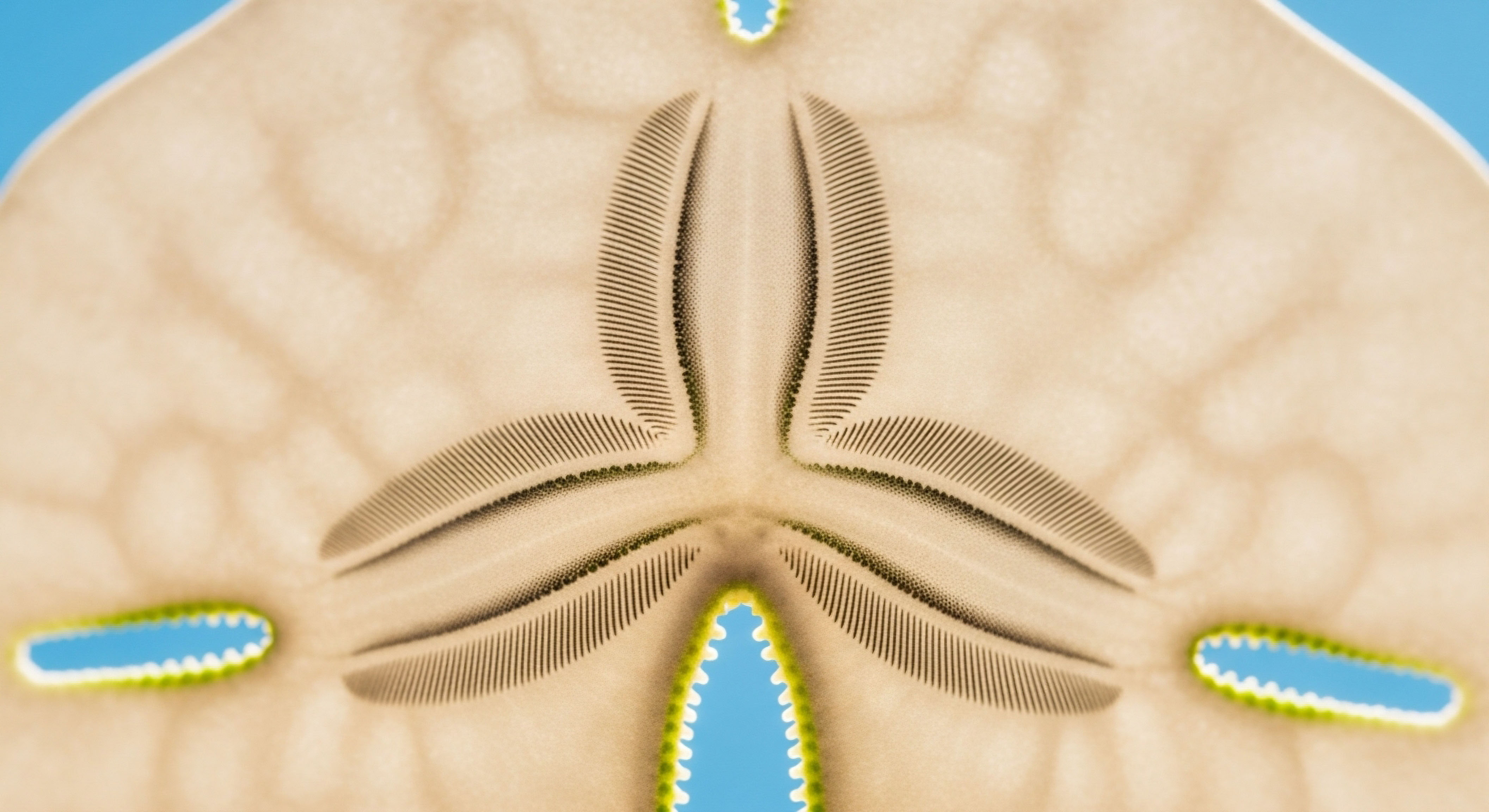

The Unfolding Map of Your Evolving Mind
The concept of aging, particularly concerning cognitive function, has long been framed as an irreversible trajectory of decline. This perspective, deeply ingrained in our collective consciousness, paints a picture of a brain that inevitably loses its sharpness, its capacity for learning, and its executive control as the years accumulate.
However, this narrative fails to acknowledge the profound biological reality of the human brain ∞ its perpetual capacity for adaptation and renewal. We are not passive passengers on a one-way journey towards cognitive entropy. Instead, our neural architecture is a dynamic, living system, capable of significant transformation and optimization at any stage of life. This understanding forms the bedrock of redefining age ∞ shifting the focus from inevitable deterioration to continuous evolution.
At the heart of this perpetual evolution lies neuroplasticity, the brain’s remarkable ability to reorganize itself by forming new neural connections throughout life. This isn’t a phenomenon exclusive to youth; it is a fundamental property that allows us to learn new skills, adapt to changing environments, and even recover from injury.
The neural pathways we forge in our formative years do not ossify; they remain malleable, responsive to experience, stimuli, and targeted interventions. This inherent plasticity means that the brain is not a static entity that merely wears out, but a dynamic landscape that can be continually sculpted and refined.
Furthermore, the hormonal milieu plays a critical role in maintaining cognitive vitality. As we age, declines in key hormones such as testosterone, estrogen, progesterone, and growth hormone are often observed. These are not mere physiological shifts; they are significant alterations in the signaling molecules that govern neural function, mood, motivation, and metabolic health, all of which are intrinsically linked to cognitive performance.
For instance, testosterone’s influence extends beyond physical attributes to impact executive functions, spatial memory, and mood regulation. Estrogen plays a vital role in synaptic plasticity and neuroprotection. Understanding these endocrine influences reveals that cognitive resilience is deeply intertwined with hormonal equilibrium.
Metabolic health is another cornerstone of cognitive longevity. The brain is an incredibly energy-demanding organ, consuming approximately 20% of the body’s total energy. Efficient energy utilization, optimal glucose metabolism, and effective management of inflammation are paramount for sustained neural function.
Dysregulation in these areas, often exacerbated by age-related metabolic changes, can lead to impaired neurotransmitter synthesis, reduced cellular energy production, and increased oxidative stress, all of which contribute to cognitive fog and reduced mental acuity. Therefore, viewing the brain as a metabolic organ, subject to the same principles of optimization as any other high-performance system, is essential for its continued vitality.
The prevailing notion of age-related cognitive decline as an immutable fact is a disservice to our biological potential. It overlooks the powerful interplay of neuroplasticity, hormonal balance, and metabolic efficiency. By understanding these interconnected systems, we can move beyond passive acceptance of aging and embrace a proactive approach to cultivating a brain that remains robust, adaptable, and capable throughout our extended lifespans. This paradigm shift empowers individuals to become active architects of their own cognitive future.
Adult neurogenesis, the continuous generation of new neurons, provides a biological foundation for lifelong cognitive plasticity, demonstrating that the brain is a perpetually adaptable system.


Precision Engineering Your Neural Command Center
To redefine age and cultivate a perpetually evolving brain, we must move from understanding the “why” to implementing the “how.” This involves a strategic, systems-based approach to optimizing the biological machinery that underpins cognitive function and overall vitality. It is about applying principles of sophisticated engineering to the body’s most complex organ, treating it not as a fragile structure susceptible to inevitable decay, but as a high-performance system capable of continuous upgrades and recalibration.

Hormonal Recalibration
The endocrine system acts as a master regulator, influencing virtually every physiological process, including brain health. Achieving hormonal optimization is not about chasing youth but about restoring the body’s internal biochemical harmony to support peak function. This often involves addressing deficiencies in key hormones that naturally decline with age.

Testosterone and Estrogen Optimization
For men, maintaining optimal testosterone levels is critical for cognitive functions such as executive planning, spatial reasoning, and mood regulation. For women, estrogen plays a neuroprotective role and is vital for synaptic plasticity and memory consolidation.
Hormone replacement therapy (HRT), when prescribed and monitored judiciously by qualified clinicians, can serve as a powerful tool to restore these hormonal balances, thereby supporting cognitive sharpness and emotional resilience. The goal is to re-establish a physiological state that promotes neural health and function, not to exceed natural physiological ranges without clear therapeutic indication.

Growth Hormone and IGF-1
Growth hormone (GH) and its mediator, insulin-like growth factor 1 (IGF-1), are crucial for cellular repair, metabolism, and neurogenesis. Declines in GH/IGF-1 contribute to reduced muscle mass, increased fat deposition, and impaired cognitive function. Targeted therapies aimed at restoring these levels can support tissue regeneration and enhance metabolic efficiency, indirectly benefiting brain health.

Peptide Signaling for Cellular Directives
Peptides, short chains of amino acids, are nature’s precision messengers, acting as signaling molecules that can direct cellular behavior with remarkable specificity. In the context of brain health and aging, specific peptides offer powerful avenues for optimization.
- Sermorelin: A GHRH (Growth Hormone-Releasing Hormone) analog that stimulates the pituitary gland to produce more growth hormone naturally. This supports cellular repair, metabolic function, and can improve sleep quality, all contributing to enhanced cognitive performance.
- Ipamorelin: Another potent GH secretagogue that works synergistically with other peptides to increase GH levels, promoting muscle growth, fat loss, and tissue regeneration.
- BPC-157: Known for its potent healing and regenerative properties, BPC-157 can support gut health, reduce inflammation, and accelerate tissue repair throughout the body, including potentially benefiting neural tissues.
- Semax/Selank: These nootropic peptides, developed in Russia, are designed to enhance cognitive function, improve memory, and reduce anxiety, acting on neurotransmitter systems and promoting neurogenesis.
The strategic use of these peptides, under expert guidance, allows for targeted intervention at the cellular level, providing precise instructions to the body’s repair and maintenance systems.

Metabolic Tuning for Neural Fuel
The brain’s performance is inextricably linked to its metabolic state. Optimizing metabolic health ensures a steady, efficient supply of fuel and minimizes damaging byproducts.

Mitochondrial Function and Bioenergetics
Mitochondria are the powerhouses of our cells, and their efficiency is paramount for brain function. Strategies to enhance mitochondrial health include targeted nutrient supplementation (e.g. CoQ10, PQQ), intermittent fasting, and specific exercise protocols that stimulate mitochondrial biogenesis. A well-functioning mitochondrial network ensures adequate ATP production, supporting the high energy demands of neural activity.

Blood Glucose Regulation
Maintaining stable blood glucose levels is vital. Spikes and crashes in blood sugar create oxidative stress and inflammation, damaging delicate neural tissues. Adopting a low-glycemic diet, prioritizing complex carbohydrates, and ensuring adequate fiber intake are fundamental. Technologies like continuous glucose monitoring (CGM) can provide invaluable data for personalizing dietary strategies.

Neurogenesis and Cognitive Resilience Support
Beyond hormonal and metabolic interventions, direct support for neurogenesis and cognitive resilience is key.

Optimized Sleep Architecture
Sleep is not merely a period of rest; it is an active state of neural restoration, memory consolidation, and cellular repair. Prioritizing sleep hygiene, ensuring adequate duration and quality (deep sleep and REM sleep), and addressing sleep disorders are non-negotiable for brain health.

Targeted Exercise and Movement
Aerobic exercise boosts blood flow to the brain, delivering essential oxygen and nutrients while stimulating the release of neurotrophic factors like BDNF (Brain-Derived Neurotrophic Factor), which supports the growth, survival, and function of neurons. Resistance training also contributes to metabolic health and hormonal balance, indirectly benefiting cognition.

Nutritional Superiority
A diet rich in omega-3 fatty acids, antioxidants, and essential micronutrients forms the raw material for brain health. Avoiding processed foods, excessive sugar, and inflammatory agents protects neural tissues and supports optimal biochemical processes.
Engineering the neural command center is a sophisticated, multi-faceted endeavor. It requires a deep understanding of biological systems and a commitment to data-driven, personalized protocols. By precisely tuning hormones, leveraging peptide signaling, optimizing metabolic function, and supporting neurogenesis, we can actively shape our brain’s trajectory, ensuring it remains a powerful engine of vitality and cognitive function throughout life.


Strategic Chronometry for Peak Biological Expression
The question of “when” to implement strategies for redefining age and optimizing brain function is as critical as the “why” and “how.” It speaks to the art of timing, the strategic deployment of interventions to align with biological rhythms and individual needs, ensuring maximum efficacy and sustainable vitality. This is not about a single moment of intervention, but a continuous, adaptive process of biological management.

Proactive Foundation Building
The optimal time to begin fortifying your biological architecture is not in response to crisis, but as a proactive measure from the earliest stages of adulthood. Establishing healthy lifestyle habits ∞ consistent sleep, balanced nutrition, regular physical activity ∞ forms the foundational layer upon which all subsequent optimizations are built. These habits create a resilient biological system that is better equipped to handle the natural shifts that occur with time.
This foundational phase involves ∞
- Establishing robust sleep hygiene patterns in your 20s and 30s.
- Adopting a nutrient-dense diet that supports long-term metabolic health.
- Integrating varied forms of exercise that build strength, cardiovascular capacity, and mobility.
- Regularly monitoring baseline biomarkers (e.g. complete blood count, metabolic panel, lipid profile) to understand your individual physiological landscape.

Data-Informed Adjustments in Midlife
As individuals enter their 40s and beyond, natural physiological shifts become more pronounced. This is the opportune period for more targeted, data-informed interventions. The data gathered from baseline biomarker assessments becomes invaluable for identifying areas requiring optimization.

Hormonal Assessment and Restoration
This is when comprehensive hormonal panels, including testosterone, estrogen, progesterone, DHEA, and thyroid hormones, become essential. If deficiencies are identified that correlate with symptoms of reduced vitality, cognitive impairment, or metabolic dysregulation, judicious hormone replacement therapy can be initiated. The “when” here is dictated by the data and the individual’s symptomatic presentation, aiming to restore a functional hormonal profile rather than merely chasing arbitrary numbers.

Metabolic Profiling and Intervention
With increasing age, insulin resistance and metabolic syndrome risk can rise. This is the time to conduct more in-depth metabolic assessments, potentially including HbA1c, fasting insulin, and lipid subfractions. Interventions, such as dietary adjustments, specific supplements (e.g. berberine, alpha-lipoic acid), or peptide therapies aimed at improving insulin sensitivity and mitochondrial function, are most impactful when timed to address emerging metabolic challenges.

Strategic Application of Advanced Protocols
Peptide therapies and other advanced bio-optimization strategies are typically introduced when foundational health is established and specific goals for enhanced performance, recovery, or cognitive enhancement are being pursued.

Peptide Stacks for Specific Outcomes
The “when” for peptides is often goal-dependent. For instance, peptides like Ipamorelin and Sermorelin might be considered for individuals seeking to improve body composition, enhance recovery from physical exertion, or support cellular repair processes that naturally slow with age. Nootropic peptides like Semax might be considered when a specific need for enhanced cognitive function or stress resilience arises. The timing is guided by the individual’s objectives and physiological status, always under expert supervision to ensure safety and efficacy.

Longevity-Focused Interventions
For those focused on extending healthspan and mitigating age-related disease, interventions targeting cellular senescence, DNA repair pathways, and epigenetic markers become relevant. The “when” for these advanced longevity protocols is often a long-term commitment, integrated into a comprehensive health strategy.

Continuous Monitoring and Adaptation
The most crucial aspect of “when” is the understanding that optimization is an ongoing process, not a one-time fix. Regular monitoring of biomarkers, response to interventions, and subjective well-being is paramount. This allows for continuous adaptation of protocols, ensuring they remain aligned with the body’s evolving needs and the individual’s life goals.
The ideal timing for any intervention is when it is supported by objective data and aligns with the individual’s overall health strategy, fostering a state of perpetual biological optimization.

The Eternal Architect of Your Vitality
The journey of aging need not be a narrative of diminishing returns. We stand at a unique epoch where scientific understanding grants us unprecedented agency over our biological destiny. Redefining age is not about halting time, but about mastering the biological systems that govern our vitality, cognition, and performance.
It is the recognition that our brain, far from being a finite resource destined for decline, is a marvel of perpetual evolution, capable of adaptation, renewal, and profound growth throughout our lives.
This is the domain of the Vitality Architect ∞ the individual who understands that the body is a complex, interconnected system, and that by applying precision, data, and strategic insight, we can engineer a state of peak biological expression.
It is about moving beyond the passive acceptance of age-related changes and actively designing a future characterized by sustained cognitive acuity, robust physical capacity, and enduring well-being. The science is clear ∞ neuroplasticity, hormonal harmony, and metabolic efficiency are not merely abstract concepts but actionable levers for sculpting a more vibrant existence.
The strategies discussed ∞ hormonal recalibration, precise peptide signaling, metabolic tuning, and robust support for neurogenesis ∞ are not fringe experiments but sophisticated applications of clinical science. They represent the tools by which we can actively manage our biological clock, not to reverse it, but to optimize its function and extend its most productive cycles. The “when” is now, and the “how” is through informed, personalized, and proactive intervention.
Embracing this perspective means acknowledging our innate capacity to be the architects of our own longevity and vitality. It is a call to engage with our biology not as a fixed inheritance, but as a dynamic blueprint, continuously refined through knowledge, intention, and strategic action. The true essence of redefining age lies in the realization that the most powerful phase of your life is not behind you, but is an unfolding potential waiting to be architected.

Glossary

cognitive function

neuroplasticity

metabolic health

growth hormone

cognitive resilience

hormonal optimization

brain health

cellular repair

neurogenesis




